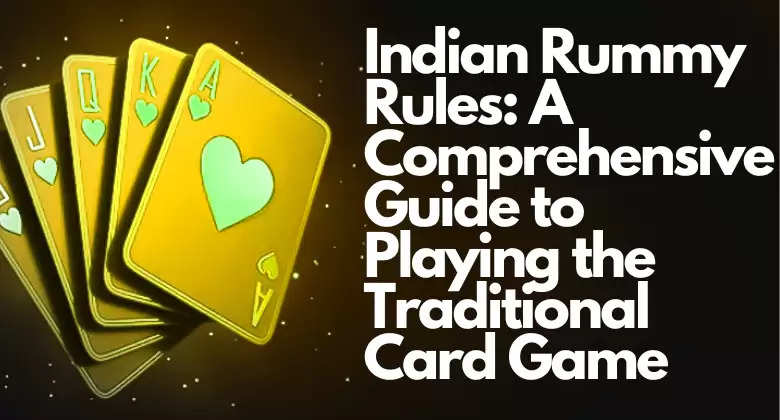Indian Rummy Rules: A Comprehensive Guide to Playing the Traditional Card Game
https://masstamilan.in/
I
Indian Rummy, a popular card game that combines skill and strategy, has been popular across India for generations. It's a cultural pastime that brings families and friends together and has also attracted many card game lovers.
This comprehensive guide will explore Indian Rummy rules in a simple and easy-to-understand language. We will also highlight how online rummy platforms have made playing this traditional card game easier in the digital age.
Introduction to Indian Rummy
Indian Rummy, also known as Paplu, is a game that is typically played with two to six players. Depending on the number of players, the game uses one or two standard decks of cards, including jokers. The game's primary objective is to arrange all the cards in your hand into valid sequences and sets.
Basic Terms
Before we go into the rules, let's familiarize ourselves with some basic terms used in Indian Rummy:
- Deck: A standard deck of 52 cards plus jokers.
- Joker: A wild card that can substitute for any other card to form sequences and sets.
- Sequence: A group of three or more consecutive cards of the same suit.
- Set: A group of three or four cards of the same rank but different suits.
- Pure Sequence: A sequence without any joker.
- Impure Sequence: A sequence that includes one or more jokers.
- Chips: While not mandatory, chips are used for wagering in a competitive game setting.
Setting Up the Indian Rummy Game
- Decks: One standard deck plus jokers is used for a game with two to four players. For five to six players, two decks plus jokers are used.
- Dealing: Each player is dealt 13 cards. The remaining cards form the draw pile, and one card is placed face up to start the discard pile.
- Joker Selection: A random card is picked from the deck to act as the wild joker for the game. All cards of that rank, regardless of suit, become jokers.
Objectives of the Game
The main objective of Indian Rummy is to arrange all 13 cards in your hand into valid sequences and sets. To win, you need to make a valid declaration by forming at least two sequences, one of which must be pure.
Drawing and Discarding
- Drawing: On each turn, a player must draw one card from either the draw pile or the discard pile.
- Discarding: After drawing, the player must discard one card from their hand to the discard pile.
Forming Sequences and Sets
- Pure Sequence: A sequence is three or more consecutive cards of the same suit without any jokers. For example, 5♥-6♥-7♥.
- Impure Sequence: A sequence that includes jokers. For example, 5♥-Joker-7♥.
- Set: A set consists of three or four cards of the same rank but with different suits. For example, 5♥-5♣-5♦.
Making a Declaration
When a player has arranged all their cards into valid sequences and sets, they can make a declaration. The declared hand is then verified for its validity.
Valid Declaration
A valid declaration must include:
- At least two sequences.
- At least one pure sequence.
- All cards are arranged in sequences and/or sets.
Scoring in Indian Rummy
The scoring in Indian Rummy is based on the value of the unarranged cards in a player's hand when another player makes a valid declaration.
- Face Cards: J, Q, K, and A are worth 10 points each.
- Number Cards: Are worth their face value (e.g., 8♠ is worth 8 points).
- Joker: Worth zero points.
The player who makes a valid declaration scores zero points. The other players score points based on the value of the unarranged cards in their hands. The player with the lowest score at the end of the game wins.
Variants of Indian Rummy
Points Rummy
In Points Rummy, each game is played for points with a pre-decided rupee value. The game is fast-paced, and the winner of each deal wins the amount based on the total points of the opponents multiplied by the point value.
Pool Rummy
In Pool Rummy, players pay a fixed entry fee, which forms the prize pool. Players gather points across multiple deals, and the player with the lowest score at the end of the game wins the pool.
Deals Rummy
In Deals Rummy, players play for a fixed number of deals. The winner is the player with the most chips at the end of the deal.
Playing Indian Rummy Online
Online rummy platforms have made it easier to enjoy Indian Rummy from the comfort of your home. These platforms offer various rummy variants, secure transactions, and a safe gaming environment.
Benefits of Playing Rummy Online
- Convenience: Play anytime, anywhere.
- Variety: Choose from different rummy variants.
- Tournaments: Participate in exciting tournaments and win prizes.
- Security: Safe and secure transactions.
Tips for Winning at Indian Rummy
- Form a Pure Sequence First: Prioritize forming a pure sequence as it is mandatory for a valid declaration.
- Use Jokers Wisely: Utilize jokers to complete impure sequences and sets.
- Discard High-Value Cards: Get rid of high-value cards early to minimize your points if you lose.
- Observe Opponents: Keep an eye on the cards your opponents pick and discard to assess their hand.
Conclusion
Indian Rummy is a timeless card game that continues to captivate players with its blend of strategy and skill. Understanding the rules and strategies can enhance your enjoyment of the game and increase your chances of winning online rummy games.
Whether you are a seasoned player or a beginner, Rummy offers endless hours of entertainment and challenge. So, gather your cards and dive into the exciting world of Indian Rummy!




